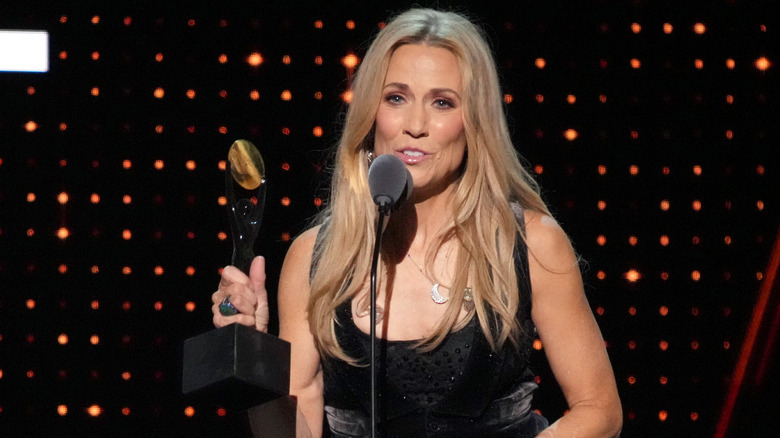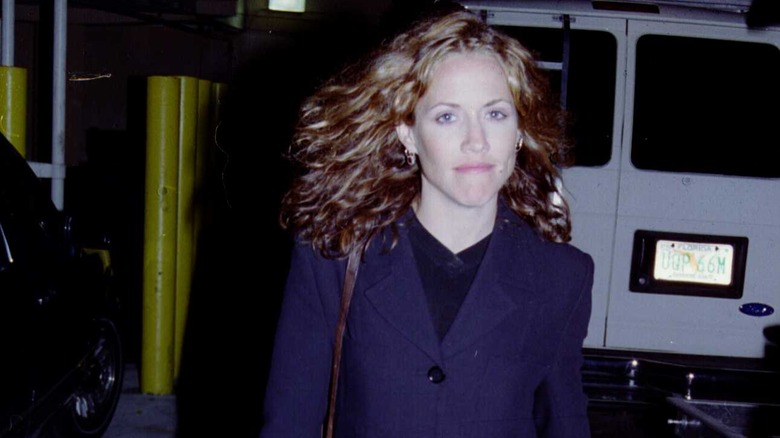The Tragic Life Of Sheryl Crow
Warning: This article contains mentions of suicide.
Sheryl Crow burst onto the music scene with her 1993 album, "Tuesday Night Music Club." The up-and-coming artist won three Grammys in recognition of her debut success, and that was just the beginning. Her fame continued to grow as she released 10 additional albums, earned six more Grammys, and accrued a stunning net worth. In 2023, the singer-songwriter's place in history was secured when Crow was inducted into the Rock & Roll Hall of Fame.
Career accomplishments aside, life has been far from easy for this iconic musician. Over the years, Crow has faced some serious health concerns. In 2006, after a high-profile breakup with ex-fiance Lance Armstrong, she was diagnosed with breast cancer. To make things even more difficult, Crow had to deal with invasive paparazzi during treatment. Fortunately, the cancer was caught early, and Crow was successfully treated with a lumpectomy and radiation. Then, in 2012, she was diagnosed with meningioma, a benign brain tumor. It was discovered after Crow was concerned about experiencing memory loss onstage. However, at the time, she was advised that surgery was unnecessary. Instead, watchful waiting was advised.
In addition to health and relationship difficulties, Crow has dealt with sexual harassment and mental health concerns. However, despite these struggles, Crow has maintained a positive outlook. After her cancer treatment, she vowed to prioritize self-care and banish her inner critic. "You've got to experience everything in [pain] so you will come out of the other side stronger and more aware," Crow explained to The Guardian in 2019.
Crow was sexually harassed as a back-up singer
Sheryl Crow left her job as a music teacher and got her first taste of stardom when she moved to Los Angeles and eventually became a back-up singer on Michael Jackson's 1987 World Tour. Unfortunately, she also experienced sexual harassment from Jackson's manager, Frank DiLeo, during the 16 months she performed on the tour. As DiLeo pursued Crow, he tried to manipulate her by offering to bolster her career or damage her prospects of stardom to get to submit to his advances.
Despite DiLeo's intimidating behavior, Crow sought legal help. Sadly, however, she was dismissed by an entertainment lawyer who didn't see DiLeo's actions as problematic. Speaking to CBS News in 2022, Crow recalled the attorney asserting, "Some people would consider themselves lucky to find themselves in this position." Reeling from the lack of support, Crow struggled with depression for approximately six months.
While Crow didn't candidly talk about being harassed by DiLeo until her 2020 audio memoir "Words + Music," she did reference the experience on "Tuesday Night Music Club." "What Can I Do For You" has dark lyrics that delve into an abuser's psyche. At the time, Crow could not have foreseen her debut album's success, and in "The Na-Na Song," she even used DiLeo's name while referencing his devious conduct. After her musical efforts led to stardom, DiLeo dangled the possibility of a lawsuit, though he never followed through with legal action.
Crow's struggled with bandmates, mental health, and a stalker fan
In 1994, Sheryl Crow's "Tuesday Night Music Club" bandmates were offended when she told David Letterman the lyrics to "Leaving Las Vegas" were based on her own life. The song was inspired by a book by John O'Brien, a friend of one of the band members. When O'Brien committed suicide soon after, his friend falsely implicated Crow as part of the reason, even though O'Brien's family asserted this accusation was false. O'Brien's suicide deeply affected Crow. "I just went into a hole," she recalled in her documentary, "Sheryl." The Letterman incident also ended the relationship between Crow and Kevin Gilbert, her then-boyfriend/bandmate. In the mid-'90s, Gilbert tragically died from autoerotic asphyxia.
Crow herself has struggled with depression and suicidal thoughts throughout her career. "There was a time ... when every night I would f***king pray that I wouldn't wake up," Crow admitted to Rolling Stone in 1996. While creating her 2002 album, "C'mon, C'mon," Crow experienced a resurgence of these difficulties and contemplated jumping out the window of her apartment.
Then, in 2012, Crow had safety concerns when a fan named Philip Gordon Sparks accused her of theft and breaking and entering. After these social media posts, Sparks allegedly announced his intention to use gun violence. To protect herself and her family, Crow went to court and received a three-year restraining order against Sparks.
If you or someone you know is struggling or in crisis, help is available. Call or text 988 or chat 988lifeline.org
Crow's breakup with Lance Armstrong was painful
Sheryl Crow experienced an intense attraction to cyclist Lance Armstrong when they met in October 2003. By August 2005, they were engaged, planning a wedding, and sharing a home in Austin, Texas. However, by t February 2006, Crow and Armstrong announced the end of their relationship. Armstrong later said the reason for the break up was that Crow wanted to have children, but since he already had three kids from his first marriage, he wasn't ready for more. "We're up against her biological clock — that pressure is what cracked it," he claimed (via Us Weekly).
Since Crow was diagnosed with breast cancer two weeks after she and Armstrong broke up, some people believed he left her because of her illness. During a 2011 interview with "Good Morning America," Crow said that was false. She also refuted Armstrong's statement about her desire for children causing the split, although she noted insurmountable differences between them. Crow admitted to still feeling love for Armstrong and having difficulty adjusting. "It's like having part of your life amputated, but you still have that phantom itch," she explained.
Two years later, however, Crow was ready to move on. After Armstrong revealed he won his cycling titles under the influence of illegal performance-enhancing drugs, Crow was weary of being asked about his doping scandal. "I don't think about him," she informed Rolling Stone. "It's a nuisance when I'm asked about him because they weren't the happiest of days."
Crow struggled with fame
When Sheryl Crow was a child, she dreamed about what it would be like to be a famous musician. While she did experience the thrill of attaining success, she also observed that, after a while, creating songs started to become tedious. In the beginning, Crow believed she could achieve success by working diligently on her music. However, she discovered she had a difficult time dealing with criticism. "I became really hard and insulted by every bad thing I read about me. I wasn't joyful," she admitted to Rolling Stone in 2013. "I'd win a Grammy, yet I couldn't internalize that I'd earned it."
In order to cope, after she released her second album in 1996, Crow made the decision to avoid reading any media coverage involving her life or career. This choice was reinforced when she decided to bend her self-imposed rule. After Crow discovered a harsh article that deflated her self-confidence, she vowed to stay true to herself and not repeat reading any press opinions.
When Crow was approached to participate in a documentary about her life, she was resistant at first. "Then I kind of warmed up to the idea of telling the story about the person, as opposed to the person that wrote [big hits like] 'All I Wanna Do,'" she explained on "The Kelly Clarkson Show." Crow came to view the project as an opportunity to connect with people who had experienced similar struggles regardless of fame, like sexual harassment or depression.
Her second album was banned
The awarding-winning success of Sheryl Crow's first album, "Tuesday Night Music Club," made it a tough act to follow. When Crow's eponymous second album was about to be released in 1996, she faced an additional obstacle. One of the tracks, "Love Is a Good Thing," which Crow co-wrote with Tad Wadhams, included the lyric: "Watch our children as they kill each other/ with a gun they bought at the Wal-Mart discount stores" (via Los Angeles Times). Wal-Mart took offense and decided to ban the album from its stores, potentially causing Crow to lose 400,000 sales.
While record execs denied that Wal-Mart asked Crow to change the lyric, she remembered a suggestion that she change the reference to another retailer, like Kmart, to avoid the album being censored. Besides losing profits with fewer sales, Crow was also disappointed because the ban would prevent fans in her hometown from purchasing her album locally. However, she was determined to uphold her personal integrity and take the risk.
While Crow doesn't know how many sales she lost, "Sheryl Crow" became a multi-platinum, Grammy-award-winning album. Financial success aside, Crow sees this incident as a positive experience. "It's not the 50,000 or the 50 million records that you've sold," she explained to MSNBC. "It's the times that you stood up for something that you will forever feel proud of more than anything else."





